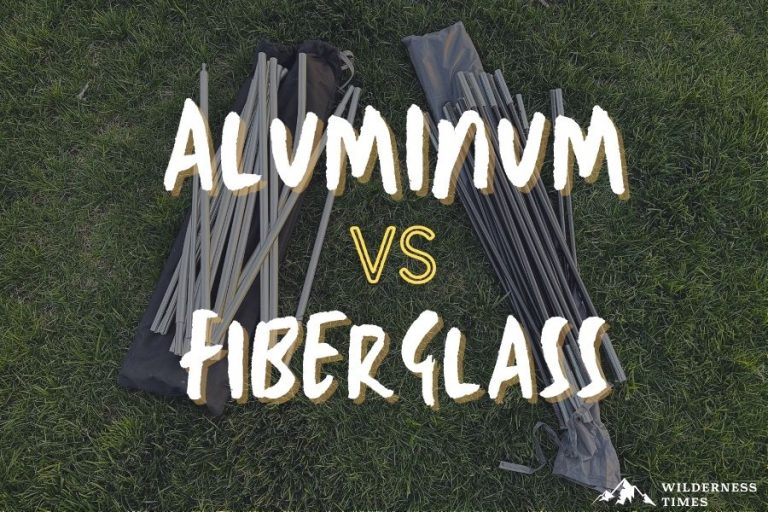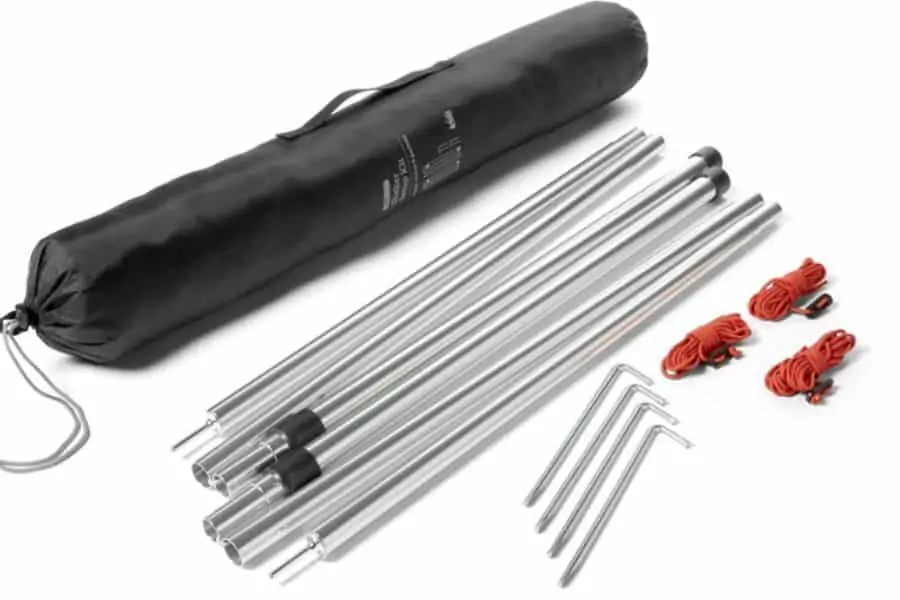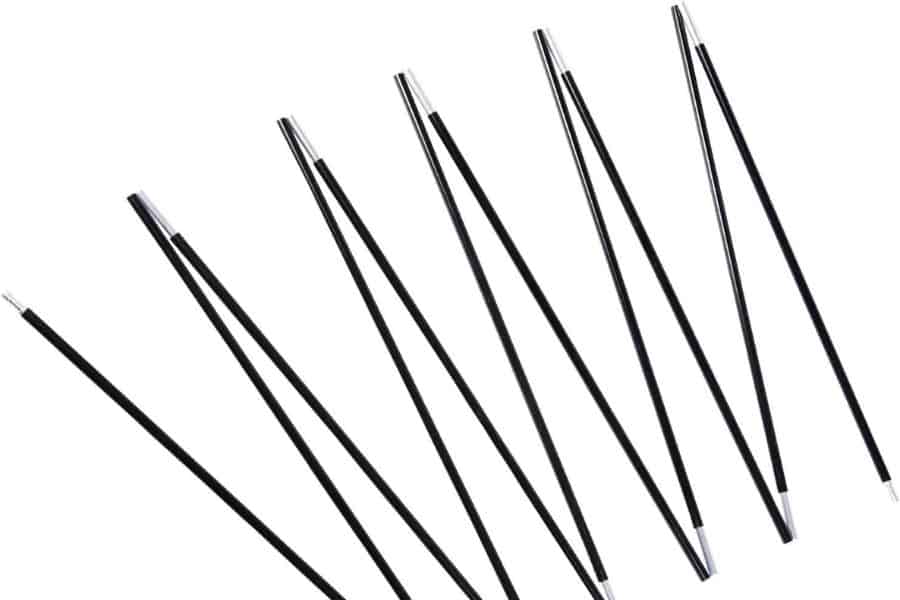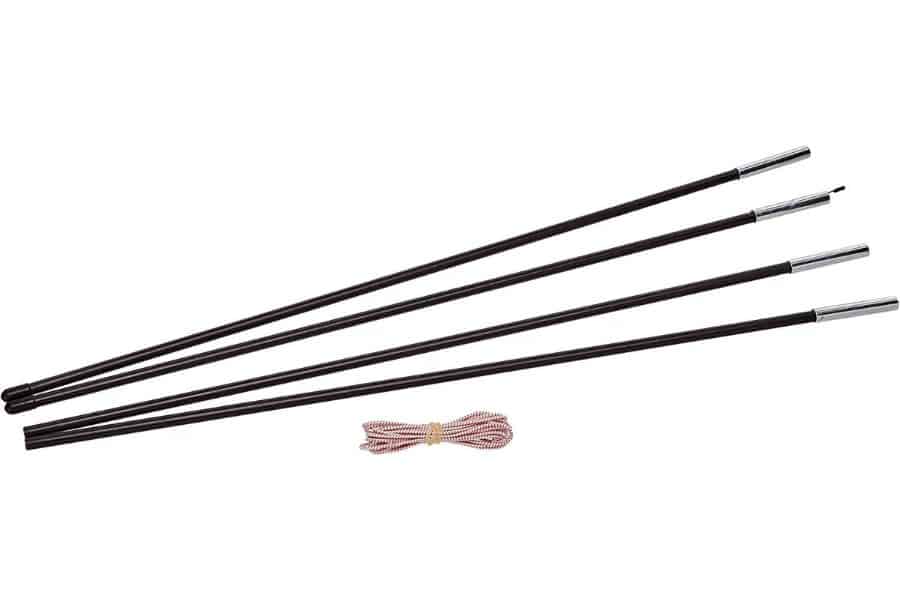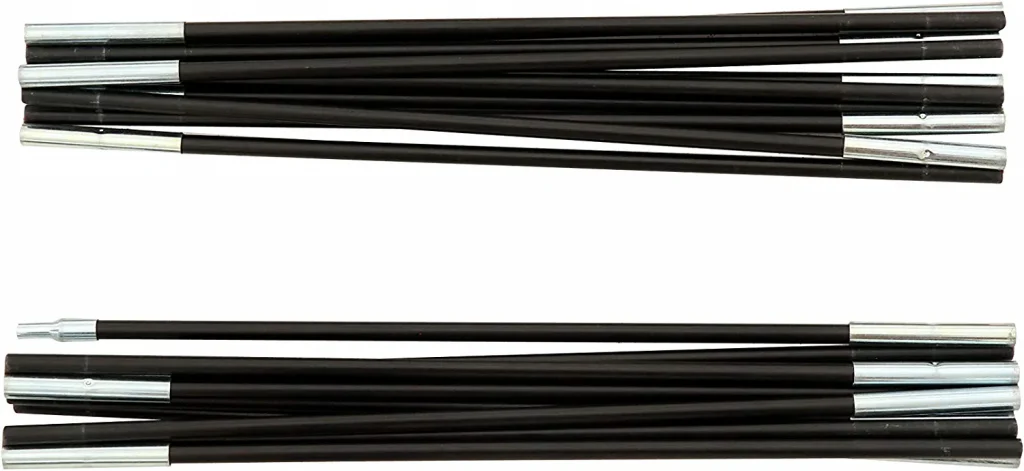Buying replacement poles or simply curious which type of tent pole is the best?
Pole material is definitely an important factor to consider when purchasing a tent.
The two most popular choices are aluminum and fiberglass. But which is better?
The short answer: aluminum poles are better than fiberglass.
But now you need to know why that is … let’s dive in!
Table of Contents
ToggleAluminum Vs. Fiberglass Poles – Which is Better?
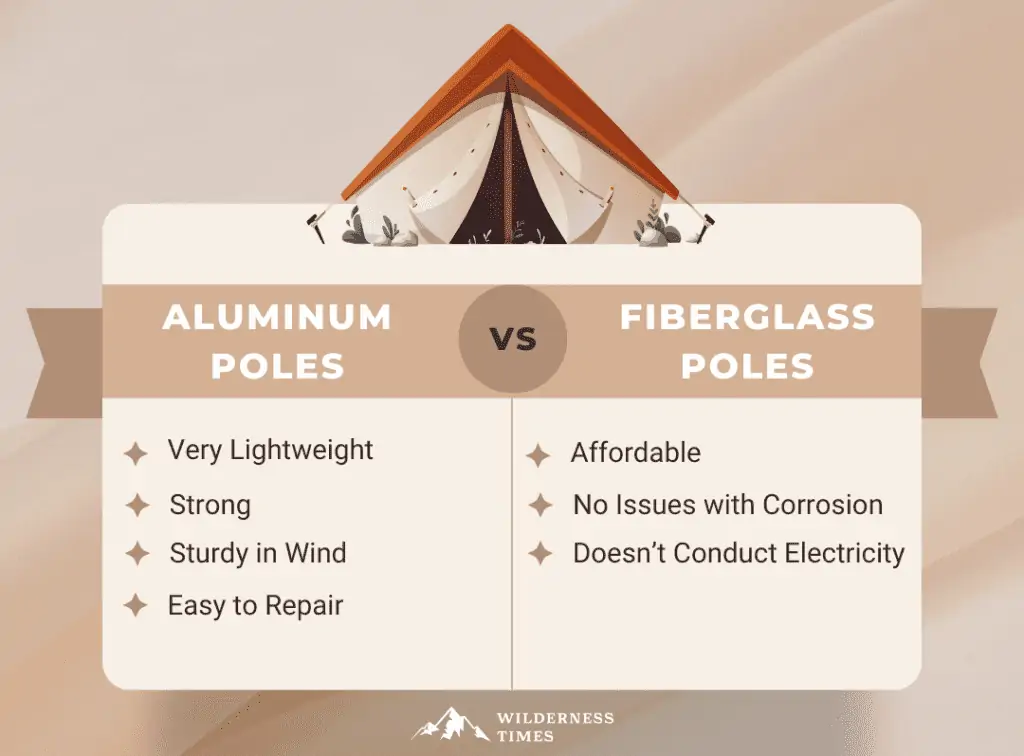
Let’s cut to the chase – aluminum is such a popular choice for tent poles for a good reason.
They have a great weight-to-strength ratio and are highly versatile.
They’re suitable for tents of all sizes as well as practically all weather conditions.
That’s not the case with fiberglass. BUT, while not quite as versatile as aluminum, fiberglass can be a great option if you’re budget camping during warmer months.
To understand the actual difference between the two types of poles, let’s discuss each of their advantages and disadvantages individually.
Aluminum Tent Poles
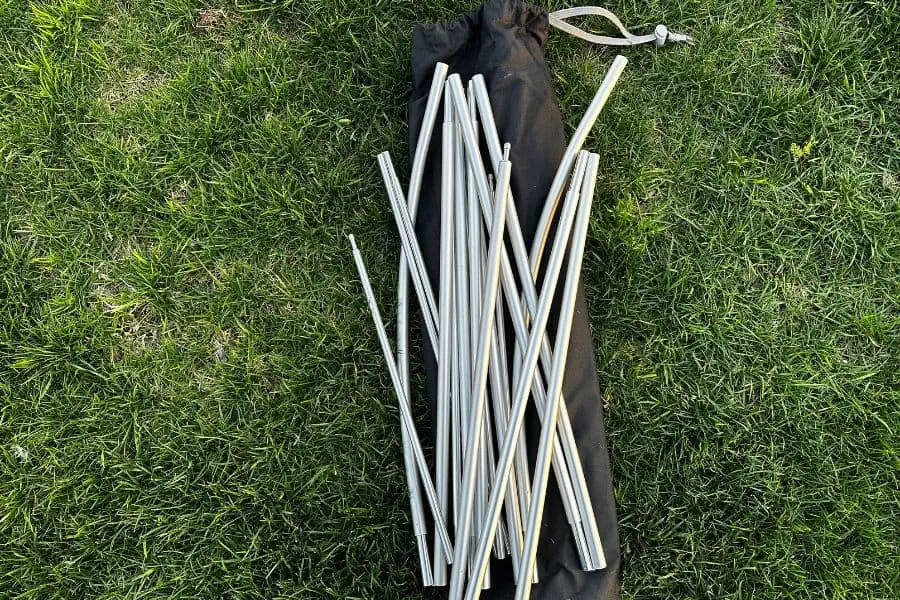
There’s about a 50% chance your tent came with aluminum poles.
This material has its good and bad sides, but the advantages definitely have the upper hand.
Pros of Aluminum Tent Poles
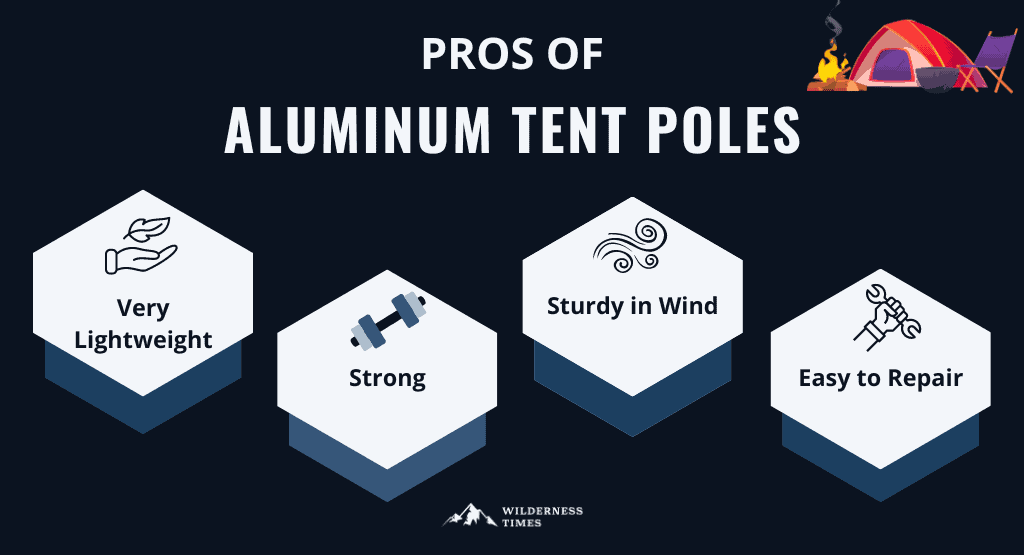
Aluminum poles are a popular choice for their numerous advantages over other materials, including fiberglass.
Lightweight
As I already said, aluminum has a great weight-to-strength ratio.
A single aluminum pole can weigh no more than 6 ounces, which is hardly going to weigh you down on the trail.
You might not care about weight when you’re car camping, but it’s especially important when you’re backpacking, and that’s where aluminum poles shine.
Backpacking tents are designed to be small and light, so yours will probably feature just two intercrossing aluminum poles.
Tent material aside, the poles will weigh no more than a small water bottle.
Strong
Even though they’re so light, aluminum poles are extremely sturdy.
You’ll see many large tents opting for this type of pole. And really, aluminum poles do a great job at providing your tent with the support it needs to stay pitched.
Why is that, you might ask?
Well, because aluminum is soft and malleable. Now, we won’t get too technical here, as scientific explanations can kill all the fun.
What we as campers need to know is that aluminum won’t snap easily under the weight of your tent.
So instead of simply breaking and collapsing from a heavy tent material, aluminum poles will successfully withstand a lot of stress put on them.
For that reason, many canvas tents actually feature tent poles made from aluminum.
Sturdy in Wind
Because they bend rather than break, aluminum poles are a great option for windy weather.
When the wind is blowing, it hits the side of your tent walls, causing them to sway in different directions.
Being so malleable, aluminum poles will allow the tent to move a bit in the wind. Now, that is actually a good thing.
By allowing some movement instead of trying to fight it back, aluminum poles mitigate the strength of the wind and its impact on your tent.
Read: How Much Wind Can A Tent Withstand?
Easy to Repair
This is yet another advantage resulting from the malleability of aluminum.
When force is applied to aluminum poles, they’re more likely to bend rather than shatter from it.
And while you surely have a pole repair kit packed up with you, fixing a bent pole is always much easier than actually repairing it, especially when you’re on the trail.
Cons of Aluminum Tent Poles
While great, aluminum poles are by no means perfect. There are some disadvantages that may cause you to think twice before getting them.
Price
Aluminum is waaaay more expensive compared to fiberglass, which makes sense given the manufacturing process.
Aluminum is a type of metal found in mineral deposits around the globe, and the first step towards making things out of this material is extracting deposits – which is an expensive process.
While it’s true that aluminum is the most widespread metal on Earth, making up more than 8% of the Earth’s core, that doesn’t mean there’s an unlimited source of it sitting around.
In fact, we’ve been experiencing a shortage of aluminum for several years now.
True, it’s mostly caused by the economic and geopolitical situations in the world, but that doesn’t change the fact that this material has become harder to come by in recent years.
And for that reason, it became even more expensive.
Corrosion
In case you don’t know, corrosion is the deterioration of metal caused by chemical or electrochemical reactions on its surface.
There are many causes of metal corrosion, including exposure to oxygen, hydrogen, electrical current and even dirt.
The corrosion can also stain your tent.
In the case of aluminum, corrosion is caused by exposure to moisture and acidic or alkaline environments.
And the biggest culprit – camping on the beach.
You don’t need to drench your tent in salty sea water for it to corrode.
When you’re camping on the beach, there’s already enough salt in both the air and the sand to be in constant contact with your tent poles.
But it’s not just salt that causes aluminum to rust. An acidic environment can also be damaging, and rain is typically slightly acidic.
In the case of proximity to power plants and busy highways, sulfur dioxides and nitrogen oxides cause the rain to be as acidic as tomato juice.
Now, I’m not saying that your tent poles will rust from camping in rain or at the beach once.
But constant exposure to such environments can make them more prone to corrosion.
And without proper maintenance, that can easily happen.
Electrical Conductivity
Now, I’m not saying that your aluminum poles will attract every single lightning strike in a radius of 50 miles.
But you should be aware that there’s always a slight possibility of that happening, especially if your tent is situated at the highest point in your surroundings.
Best Replacement Aluminum Tent Poles
Every tent comes with poles. But maybe you’re not satisfied with the ones that you got with your model, they broke on your last trip, you lost them…
Whatever the reason, you might be shopping for good aluminum poles. In that case, I have two recommendations for you.
REI Co-op Shelter Setup Kit
I know, this set includes not just poles but also guylines and stakes, the most important pieces of equipment for keeping your shelter in place.
But the actual poles you get in the kit are worth a mention here.
This setup kit features two 8-feet adjustable aluminum poles. They’re shock-corded and feature 4 sections, allowing you to adjust them from 79 to 98 inches.
Each adjustable section features an indexing strip, which allows you to line up push buttons with ease.
The poles are anodized, meaning they have a protective coating that allows them to resist nicks and scratches.
They also feature a rubber foot on one end for slip resistance, and a spike on the other for fitting through the grommet on your tarp.
BRILLIANCE4U Aluminum Tent Poles Replacement
If you’re looking for a more affordable option, then these replacement poles by BRILLIANCE4U might be what you need.
These poles are made of 7001 aluminum, which is aircraft-grade material.
That means they’re designed to withstand a lot of weight without breaking.
Now, you can choose from various lengths depending on what you need.
Each section is 17 inches, but the pole can be anywhere from 9 to 20 feet long when assembled.
So no matter the size of your tent, this product offers a suitable option for you.
Fiberglass Tent Poles
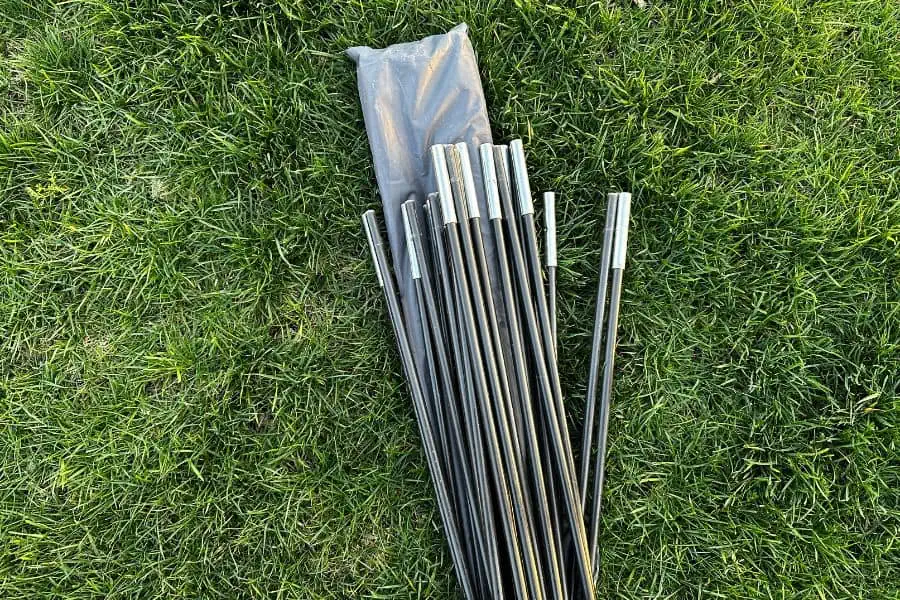
Fiberglass is a plastic material reinforced with glass fibers.
Tent poles made of this material are commonly included in low-budget tents, and in this section, we’ll see why that is.
Pros of Fiberglass Tent Poles
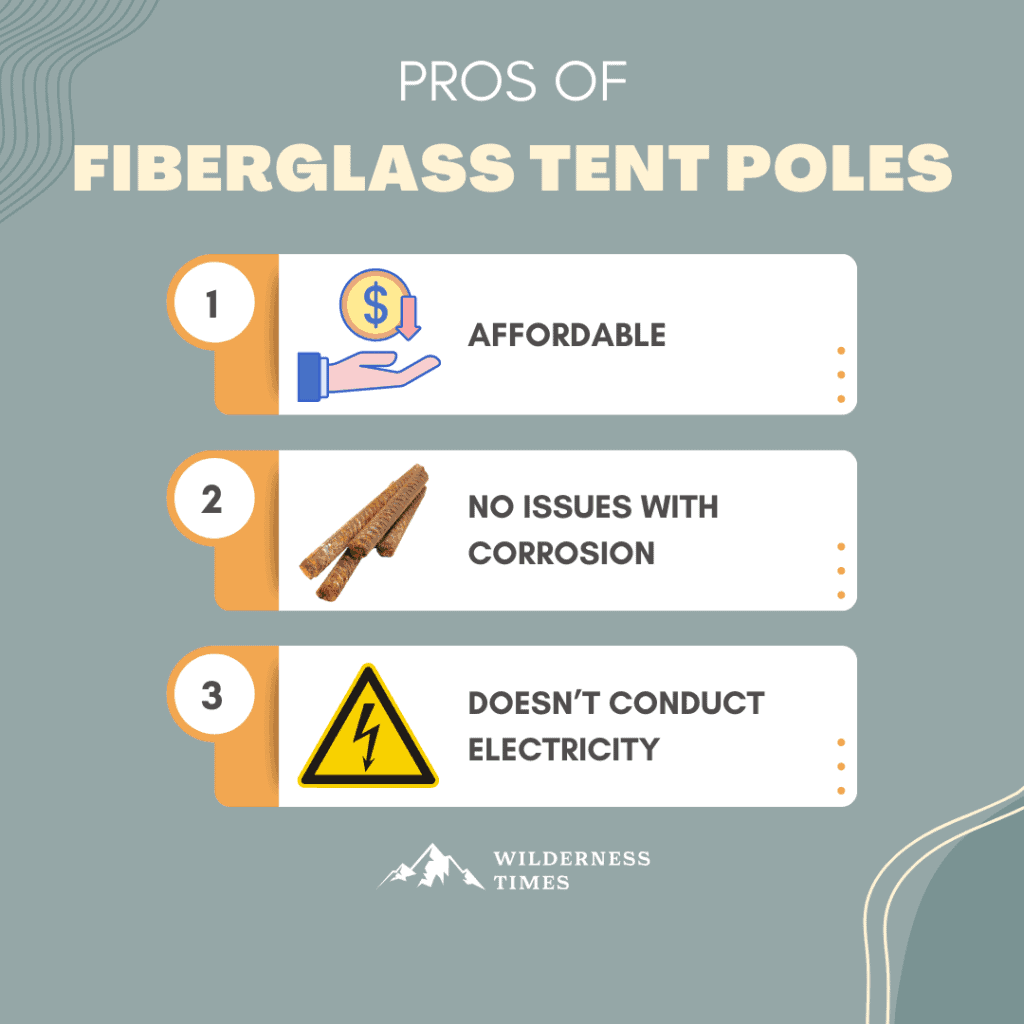
Even though fiberglass tent poles aren’t as popular as aluminum ones, that doesn’t mean they’re bad.
In fact, there are many advantages to this type of tent pole.
Cost
Unlike aluminum, fiberglass is produced in a factory. So just by taking away the cost of mining, you get a much more affordable option.
That’s why you see most entry-level tents featuring poles made of this material.
No Issues with Corrosion
Consisting entirely of non-metal materials, fiberglass isn’t affected by corrosion.
So whether it’s raining cats and dogs or your tent is constantly splashed by salty water, it doesn’t matter.
These weather conditions won’t affect fiberglass poles the way they affect aluminum ones.
So if you’re often camping near the coastline, fiberglass poles are your best friend.
Doesn’t Conduct Electricity
Fiberglass is not electrically conductive, so there’s no risk of your tent poles attracting lightning.
Of course, that doesn’t mean you can’t get hit by the bolt if you set up a tent at the highest point in your surroundings.
But the material alone isn’t an issue.
Cons of Fiberglass Tent Poles
While fiberglass has some pretty cool properties, it’s not without flaws. Here are the disadvantages of this material for tent poles.
Strength
Fiberglass isn’t particularly known for its strength, especially when compared to aluminum.
For that reason, it’s not the material you see used in extra large tents, as it won’t be able to withstand the weight.
Of course, that also means fiberglass isn’t a suitable option for bad weather either.
Typically, you see fiberglass poles for 2-season tents, which are designed for use in fair weather.
But 3 and 4-season tents are usually required to withstand heavy rain and high winds, and therefore you’d want to avoid fiberglass.
What’s more, cold weather also affects the strength of fiberglass.
In freezing temperatures, this material can easily break when you apply a bit more force.
Fragility
Unlike aluminum, which bends under force, fiberglass splinters or cracks.
And if that happens when you’re on the trail, it’s more difficult to repair compared to a bent pole.
You’ll need a repair kit, but that’s not even a guarantee that a pole will be almost as good as new.
Best Fiberglass Tent Poles
Looking for good fiberglass tent poles? Here are the two best models you can find on the market nowadays.
Coleman Replacement Tent Pole Kit
Coleman makes high quality camping gear, and tent poles are no exception.
These specific poles are 27 inches long and feature pre-attached ferrules. You get four poles in a pack, so this kit is suitable for most small tents.
The combination of 10 feets of shock cord and lead wire ensure there’s enough tension to keep your tent properly taut.
And thanks to vinyl pole caps, you don’t have to worry about ripping the fabric by accident.
Gorich Beach Tent Poles
Gorich tent poles come in several sizes, suitable for 3, 4 and 6-person tents. These poles might be thin, but don’t get fooled by that.
With fiberglass frame and durable elastic cord, these tent poles offer quite a bit of bendability without breakage.
Each section is 17 inches long, and depending on the size of the tent, there’s between 10 and 14 sections on each pole.
But the best part about these poles is the guarantee.
I’m pretty sure you’ll like them, but if you don’t, you can contact the manufacturer and it will make it right.
| Characteristic | Aluminum Poles | Fiberglass Poles |
| Weight | Lightweight | Slightly heavier |
| Strength | High strength | Medium strength |
| Corrosiveness | Susceptible to corrosion | Corrosion resistant |
| Bendability | Bendable | Brittle |
| Price | Costly | Affordable |
Faqs
Are fiberglass tent poles cheaper than aluminum poles?
Fiberglass poles are much cheaper than aluminum poles.
That’s mainly because they’re made of synthetic material, while aluminum is an ore which needs to be mined from mineral deposits.
Which tent poles are lighter weight?
Aluminum is extremely lightweight, which makes it a perfect option for backpacking and trekking.
Fiberglass is relatively light, but nowhere near aluminum.
Do aluminum tent poles corrode?
Like most metals, aluminum is susceptible to corrosion. If exposed to moisture as well as too alkaline or acidic environment, it will rust over time.
However, if you maintain them regularly after camping in such an environment, you can prolong the life of your tent poles.
Do aluminum tent poles bend?
Aluminum is a highly bendable material. And in terms of tent poles, that’s actually a good thing.
In the case of heavy rain and high winds, the poles will bend but not break, thus keeping your tent in place.
Do aluminum tent poles attract lightning?
Like any other metal, aluminum is conductive. And in case your tent is set up at the highest point in your surroundings, there’s a chance of it attracting lightning.
Which pole material is best to prevent lightning?
Fiberglass is a synthetic material consisting of plastic and glass, neither of which is conducting electricity.
In the case of thunderstorms, poles made of fiberglass are your best option.
To Sum Things Up
Whether aluminum or fiberglass tent poles are better for you, it depends on your camping environment.
If you’re looking for a durable and sturdy solution, aluminum is your best bet. But it’s also rather expensive.
If you’re on a budget and camping every once in a blue moon, you can easily pass with fiberglass poles.
But you can’t go wrong by getting both types of poles (and tents) and switching them depending on the type of your camping trip (and tent).


